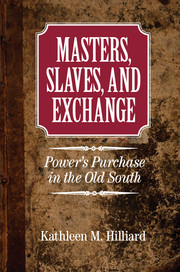1 - Money and Moralism
Published online by Cambridge University Press: 05 June 2014
Summary
What do slaves want with money? What good can it possibly do them?
So asked a contributor to the Southern Cultivator in April 1860. With Republicans ascendant and secession agitation reaching fever pitch, the author, A. T. Goodloe, struggled to maintain some semblance of order on his plantation. He feared his slaves, with cash in hand, would wander “wherever their inclination may lead them” and that money would end up in the hands of proprietors of local dram shops, “road-side groceries,” and other “filthy institutions.” Anxious to maintain a productive, obedient, and healthy workforce, Goodloe viewed these venues of consumption as dangerous temptations and sought to remove opportunities for their patronage. Yet, despite these fears, Goodloe remained cognizant of the needs and, more importantly, material desires of his bondpeople. Bestowing extra goods was a way to allay long-term discontent and keep his people close to home.
But what, exactly, did his slaves want? How could he be sure he was fulfilling their material desires so as to prevent them from seeking opportunities outside of his control? Goodloe shared his solution with readers of the Southern Cultivator. He urged the slaveholder to “[t]ake his negroes to the nearest dry goods store, or send the overseer with them (do not let them go alone) and let them select such things as suit their fancies, within a certain limit, and pay for the goods himself; always rewarding more liberally those that have performed their duty best.” Even though slaveholders differed in their management techniques and many likely scoffed at Goodloe’s liberality, the struggle to maintain an obedient workforce was universal and one often addressed through a process of negotiation and manipulation of slaves’ material wants, needs, and desires. Slaveholders’ journals and prescriptive literature are filled with thoughtful and often anxious considerations about material exchange between master and slave.
- Type
- Chapter
- Information
- Masters, Slaves, and ExchangePower's Purchase in the Old South, pp. 15 - 45Publisher: Cambridge University PressPrint publication year: 2013

